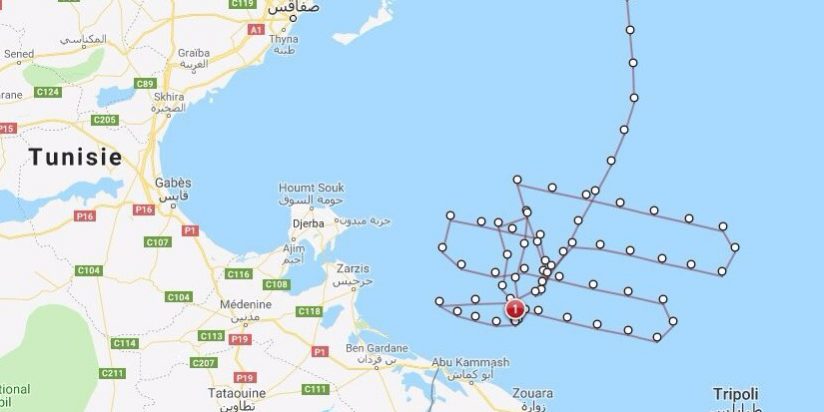Yesterday, Sunday, the crew of the surveillance aircraft Colibri witnessed once again a dramatic case of failure to render assistance by the Italian authorities. A rubber boat with over 80 refugees was in distress at sea for over 9 hours and was finally towed back to war-torn Libya by the country’s so-called Coast Guard.
At 10:43 a.m. local time, the Colibri surveillance aircraft of the French organisation Pilotes Volontaires, in collaboration with Sea-Watch, spotted a rubber boat with about 80 refugees on board, about 21 nautical miles from Abu Kammash, Libya. The people on the boat were in acute danger to life and limb, because the poorly equipped, overloaded and non-seaworthy inflatable boats can collapse at any time. According to the EU military mission EUNAVFOR MED, every inflatable boat departing the Libyan coast is therefore an acute sea emergency.
The Colibri crew immediately informed the Italian Maritime Rescue Coordination Center (IMRCC) in Rome about position and condition of the boat in distress. Instead of launching a rescue operation, which is every MRCC’s duty, Rome referred the airplane crew to the newly established and often inactive headquarters of the so-called Libyan Coast Guard. There, Colibri’s distress call wasn’t received despite multiple attempts by the crew.
A merchant ship, which could only be persuaded to attend the boat in distress after repeated requests by the crew, observed the situation, but was afraid to intervene because of the justified fear that it might end up in a situation similar to that of the civil rescue ships Aquarius and Lifeline, or the Italian coastguard ship Diciotti. After rescuing people from distress off the Libyan coast, the ships had been delayed in a political ping-pong game in which Italy and Malta had refused to receive the rescued over multiple days. “Apart from the fact that merchant ships are not equipped or trained to conduct rescues of this scale, it is also EU policy that blocks the rescue. Not to mention the three rescue ships, Lifeline, Sea-Watch 3 and Seefuchs, which could have helped had they not been detained arbitrarily in Malta,” says Johannes Bayer, Chairman of Sea-Watch.
Around 20:00, more than eight hours after the distress became known, the refugees were finally picked up by a speedboat of the so-called Libyan Coast Guard and abducted back to Libya. The survivors await illegal detention in camps without access to medical care or food, where torture, slavery and sexual assault are regular.
“In this case, the inhumane blockade mentality of European governments towards sea rescue in the central Mediterranean has once again condoned the deaths of over 80 people and has finally abandoned them to be taken back to Libya, a country of civil war. The EU, therefore, shares responsibility for the inhumane treatment they receive there. Just as it bears responsibility for the presumably over 100 deaths of the last boat accident at the beginning of September, of which the world only learned by chance because MSF was able to gain access to survivors in Libya. Nobody knows how many boats sink without anyone noticing,” says Tamino Böhm, Colibri’s Operations Director.











